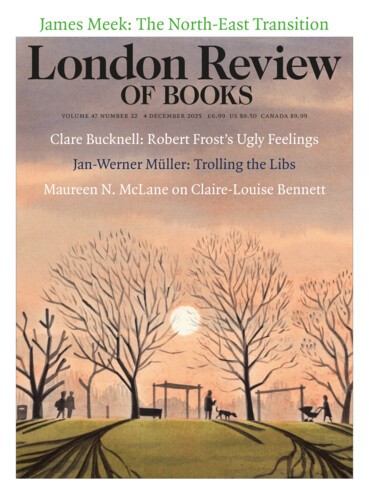‘We make the best weapons in the world, and we’ve got a lot of them,’ Trump told the Knesset on 13 October.
And we’ve given a lot to Israel, frankly. Bibi would call me so many times, ‘Can you get me this weapon, that weapon, that weapon?’ Some of ’em I never heard of, Bibi, and I made ’em! [Laughter] But we’d get ’em here, wouldn’t we, huh? And they’re the best. They are the best. And you used them well. It also takes people that know how to use them, and you obviously used them very well. What a job! What a job you’ve done … Those are just a few of the reasons why I am proud to be the best friend that Israel has ever had.
Many things about the society of the spectacle are now so familiar that hashing them over gets tedious. We’re all tired of apocalypse-speak. Nonetheless, the spectacle still has a few surprises up its sleeve. Some corners of the ‘social’, hitherto allowed their primitive ethnologies, are suddenly being pulled into the present. Politics, for instance – what has to be hidden, and what has now not to be hidden, in the conduct of a state. Political hypocrisy, that essential lubricant, seems to be under threat.
Trump’s speech to the Knesset, or at least the part quoted here, wasn’t widely reported. I see why. It may have been (strange times we live in) a case of genuine media revulsion. Readers need the newsroom to skim off obscenities. But it’s hard to imagine the Murdoch boys having an attack of good taste. No doubt fear of the oil-slick charge of antisemitism was more to the point. Trump, the genius of détournement, delights in saying out loud what the ‘lunatic left’ is accused (by Trump’s friends) of whispering behind its hands. You can feel him daring his real enemy – the media mainstream – to repeat the charges.
In the Knesset speech, after crowing over his first administration’s recognition of Jerusalem as Israel’s capital, Trump had fun outing the AIPAC purchasers of the US political class. ‘Isn’t that right, Miriam?’ he shouted over to the widow of the Las Vegas billionaire Sheldon Adelson.
Miriam and Sheldon would come into the [Oval] Office … I think they had more trips to the White House than anybody else … Look at her, sitting there so innocently. She’s got sixty billion in the bank. Sixty billion. [Laughter.] I think she’s saying ‘No, more!’ And she loves Israel … Her husband was a very aggressive man, but I loved him … very supportive of me. And he’d call up: ‘Can I come over and see you?’ I’d say: ‘Sheldon, I’m the president of the United States, it doesn’t work that way.’ [No laughter at this point.] He’d come in … they were very responsible for so much.
This is what we are supposed to believe has always happened – behind closed doors. When the master of spectacle glories in telling us we’ve been right, especially about the just past and the glorious present, isn’t it clear that ‘politics’ is shedding a skin?
What, then, is the politics of the spectacle at present? A politics where nothing is hidden? (Or none of the things that used to be.) Why did such a politics come into existence, however fitfully, and why has it so quickly shrugged aside the previous protocols and constraints on state action? The following questions make a beginning.
What would politics be like in an age where one empire continued to hold sway over the ‘international community’, as it had done for three or four generations, but had to react to its power weakening and sputtering, except in the realm of representation? Such an empire would, I think, stake everything on that remaining power, and treat us endlessly to the spectacle of its own dissolution. It would do so because it realised that its primacy in the matter of style – its ability to draw politics into the realm of celebrity and meme-esis, where its power remained absolute – was one to which its economic rivals had no answer. (They try, God knows. Those with strong stomachs might look online for recent Chinese high-pop renderings of the ‘Internationale’.) And style – more and more, given the present state of the market – is hard currency.
What would politics be like in an age in which the economy – in other words, capitalism, its worldwide web stretched tight – had become absolutely preponderant? That is, where politicians no longer had control, or even the pretence of control, over the key decisions affecting their societies, their ways of arranging or reconstructing human interaction, their direction of travel. And this powerlessness had become part of spectacle – dramatised in the ‘rule of the bond market’ etc.
Politics would then be about war. It would retreat to the realm where the state still called the shots. ‘What a job you’ve done.’
What would a politics be like that was obliged at last to be fully part – helmsman and figurehead, spokesman and step-’n’-fetch-it – not just of capitalism, but of capitalism as form of life, capitalism as terminator of anything resembling society?
This question more or less answers itself. It would be like Trump. It would flaunt its emptiness. The Alaska red carpet, the poker game with the Nobel committee, the Kirk apotheosis, surrender in the tariff war with China, the bunker busters that didn’t. It is precisely the lack of substance here that’s the point. Look what I can do to politics!
Many of us had been waiting to see what a society would look like once consumerism had done its work, pumping out its pathogens long enough for ‘consumer society’ to be a completed reality, not just a convenient label. Now we know. But questions remain. Why is political visibility the imperative – with the word being a synonym for stream-of-politics, non-stop ‘events’, blurted overtness, un-secrecy, ‘great television’? Why in particular is Trump so confident that washing his empire’s dirty linen in public, gloating over genocide, widening his eyes at the thrill of mass murder, is now what can be done, and must be done, if power is to preserve itself?
The master is aware that the electorate disapproves. Polls in the US are agog at the collapse of support for Israel. Once scurrilous stories about AIPAC and its congressional ‘representatives’ have become internet staples, leaking into talk shows and podcasts. And the world? Think of the maestro on a roll in Jerusalem, riding the thermal of the rest of the world’s disgust. ‘Can you get me this weapon, that weapon, that weapon? Some of ’em I never heard of, Bibi, and I made ’em! But we’d get ’em here, wouldn’t we, huh? And they’re the best.’
Of course he cares about the polls. He cares about polls and dollars. The polls told him to tell Bibi to stop his war in Gaza or appear to; and he did. AIPAC had the wind up. But that still leaves us with the spectacle of Trump gloating in public over mass destruction and the purchase of a political class. He knows that everything he says is reported, even if not in the New York Times. He wants the world to know he knows what politics consists in, and that his politics is moving the business (‘the job’) into the open.
It’s like George Eliot’s story ‘The Lifted Veil’. Suddenly the inner thoughts of power are projected onto the screen in everyone’s hand – all the drivelling banalities, the selfishness, the contempt for others, the lack of interest in anything the world has to offer except personal gain, the malice, the ignorance, the ludicrous certainties. Many liberals were shocked, I gather, by Stephen Miller’s homily at the memorial for Charlie Kirk:
The day that Charlie died the angels wept. But those tears have been turned into fire in our hearts … When I see [Kirk’s wife] Erika and her strength and her courage, I’m reminded of a famous expression. The storm whispers to the warrior that you cannot withstand my strength and the warrior whispers back, I am the storm …
We are the storm. And our enemies cannot comprehend our strength … Our lineage and our legacy hails back to Athens, to Rome, to Philadelphia, to Monticello. Our ancestors built the cities. They produced the art and architecture. They built the industry …
The light will defeat the dark. We will prevail over the forces of wickedness and evil. They cannot imagine what they have awakened …
And to those trying to incite violence against us, those trying to foment hatred against us, what do you have? You have nothing. You are nothing. You are wickedness. You are jealousy. You are envy. You are hatred. You are nothing. You can build nothing. You can produce nothing. You can create nothing …
And what will you leave behind? Nothing. Nothing. To our enemies: you have nothing to give. You have nothing to offer. You have nothing to share but bitterness. We have beauty. We have light. We have goodness. We have determination. We have vision. We have strength. We built the world that we inhabit now … You cannot terrify us. You cannot frighten us. You cannot threaten us. Because we are on the side of goodness. We are on the side of God.
And I promise you my friend, I promise you my brother, we will prove worthy of your sacrifice. We will prove worthy of your time on earth. We will make you proud. We will finish the job.
Well, it’s not the Gettysburg Address. But shouldn’t we be exulting at being recognised? Shouldn’t we be laughing at Miller’s chiliastics? And didn’t Miller have it right? We’re not beautiful. We don’t build things. At present we have nothing to share but bitterness. We’re nothing, really. We don’t have it in us to do the Gaza job.
Isn’t it a step forward to have politics become openly hysterical, godly, content-free, the last bit of air pumped out of the inter-state vacuum? You’re not regretting the exit of the grown-ups from the room, are you? Remember who they were. Remember what they did. Look at the civilian-to-combatant death ratio for the Battle of Mosul. (A good battle.) Why should we be leaving such facts to Israel’s apologists? On this measure, the apologists are right: Gaza is what grown-ups with weapons – ‘this weapon, that weapon, that weapon’ – have always done.
We are nothing, and they have the drones: that sums it up. And don’t put your money on Marx’s ‘but we must be everything’ to complete Miller’s sentence. ‘Everything’ is the world just round the corner, in full eco-collapse. Wait till post-Trump politics gets hold of that.
Send Letters To:
The Editor
London Review of Books,
28 Little Russell Street
London, WC1A 2HN
letters@lrb.co.uk
Please include name, address, and a telephone number.


